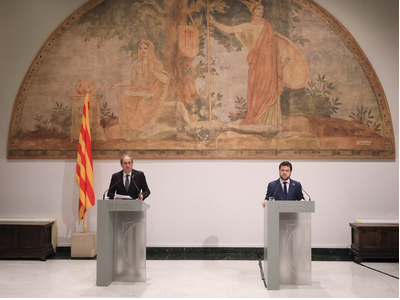- The project will mobilise expertise, knowledge and resources under the leadership of a gender-balanced group of 30 experts from a range of disciplines
- Vice-President Aragonès stressed that the working group will be “completely independent”
- The final document setting out analysis and proposals for each strategic area is expected to be completed by February 2021

The president of the Government of Catalonia, Quim Torra, and the Vice-President and Minister of Economy and Finance, Pere Aragonès, gave a press briefing yesterday to present the Catalonia 2022 strategy, approved at a meeting of the Executive Council yesterday morning. The strategy will focus on analysing post-Covid-19 scenarios and projects for the future. The head of the executive said the project was aimed at analysing the post-Covid-19 Catalonia and “building a new and disruptive future”, stressing that the project was based on a national strategy and would seek to build a broad consensus and take maximum advantage of expertise and talent in Catalonia.
On Monday, President Torra headed the first meeting of the working group, whose mission will be to help Catalonia prepare for the world of 2022 and beyond by analysing future scenarios and putting forward proposals for action. Vice-President Aragonès also took part in the meeting.
In a press briefing following yesterday’s meeting of the Executive Council, the head of the government said that to successfully tackle the fallout of the current crisis, “we must look forward and envision the new future that we need to build together […]. That can’t be done by the Executive Council on its own or by Parliament; we need to involve all of Catalan society.”
The Catalonia 2022 initiative aims to mobilise expertise, knowledge and resources in order to develop policies and strategic directions within the framework of two simultaneous layers of action: one focusing on the short term, the other on the medium and long term. The goal is to involve talented individuals from a wide range of areas, including diverse social and cultural contexts as well as different fields of knowledge. “We’ve identified the people with the most expertise – prominent individuals, both at the national level and internationally, who can help Catalonia gain a competitive advantage,” the president said.
The group will be led by 15 men and 15 women from a range of disciplines, who will work to “design a new future so that we don’t make the mistake of rebuilding based on past models”. The 30 project leaders will be jointly coordinated by Victòria Alsina and Genís Roca.
Vice-President Aragonès stressed that the group’s goal is to “sketch out a vision of the post-Covid-19 Catalonia” by engaging in a process of “collective reflection that identifies underlying trends and the reality Catalonia will be faced with in the future”.
The vice-president said the group will include experts “with a proven track record and capabilities”, from a wide range of areas, including research, business, culture, social initiative and government agencies. “These are people who have worked in Catalonia and around the world, so they can help us attract the talent we need to carry out this process of collective reflection.”
Aragonès said that participating experts will be organised in autonomous working groups that will involve many more professionals, and which will work with “complete independence”.
The vice-president said that since the onset of the pandemic, the Catalan government has worked on three fronts: first, addressing the most immediate health and mobility needs; second, taking action to meet economic and social needs; and third, seeking to develop a vision of the future with broad support across society.
First proposal after the summer
The group led by the 30 experts will start by preparing an executive document setting out possible scenarios for 2022 and beyond. Based on the results, the group will decide what key areas to focus on. Specific work will then be done on these areas to identify risks and opportunities and develop proposals for action.
The first document identifying future scenarios is expected to be completed by the autumn. The final document, which will include analysis and proposals for each strategic area, will be presented in February 2021.
It is estimated that there will be between 10 and 15 key areas, and each specific group will have 20 to 30 members. The process will therefore involve a total of nearly 400 people, ensuring diversity, representativeness and legitimacy, both from a social perspective and in terms of technical expertise.
Specific groups for each area
Each key area will be the focus of work by a specific group led by a coordinator with the direct support of four individuals (one from the public administration, one from academia, one from the social sphere, and one from the world of private enterprise) and a broader group of some 20 experts.
The working group will take the Covid-19 crisis as its starting point and work in three distinct stages:
- management of the emergency;
- management of support for people and the process of repairing the damage done (until a treatment or vaccine is developed, possibly in late 2021);
- adaptation to a new reality following the development of a treatment or vaccine (from 2022 on).